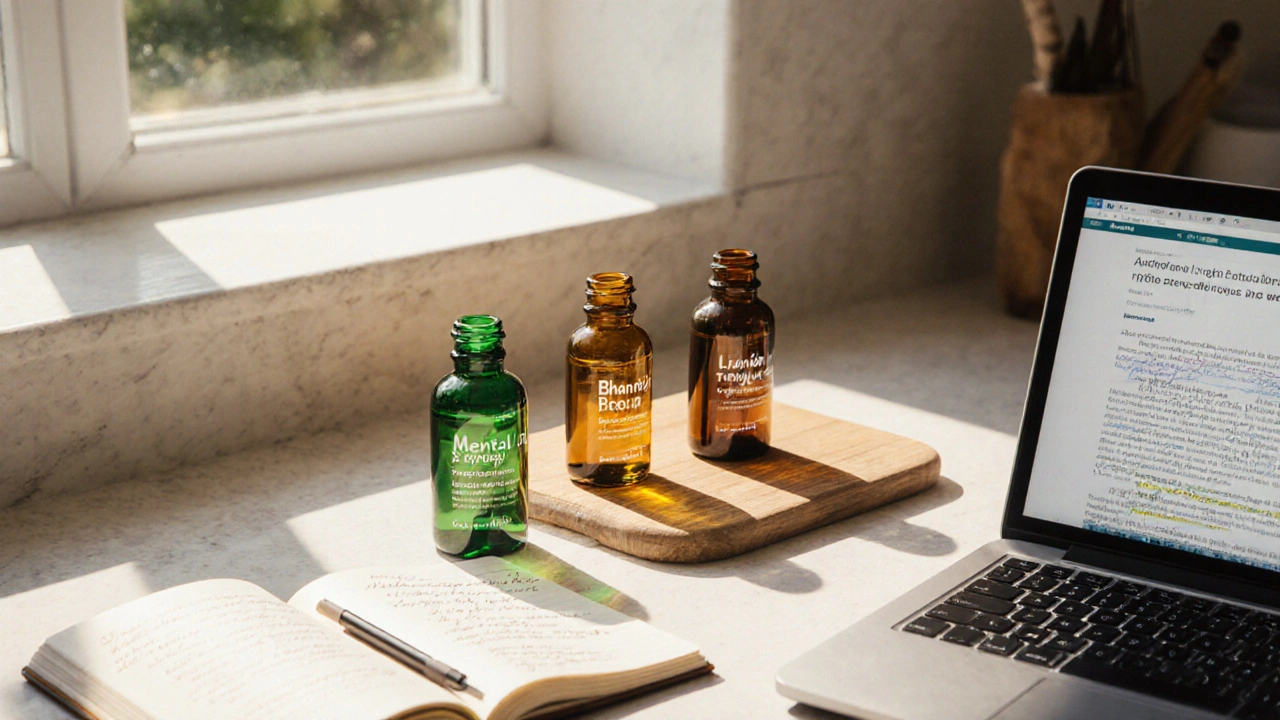Herbal Nootropic Comparison Tool
Select your cognitive goal and preferred supplement to see how it compares:
Quick Take
- Mentat DS syrup delivers 250mg of bacosides per 5ml dose, ideal for steady daily use.
- Ashwagandha excels for stress‑reduction, but its cognitive edge is milder than Brahmi.
- Ginkgo biloba offers vascular support; combine only if you need extra circulation.
- Lion’smane shines for nerve‑growth factors, perfect for creative work.
- Price per month: Mentat DS (~£28) sits between premium mushroom blends (£35) and budget herb capsules (£15).
What is Mentat DS Syrup?
Mentat DS syrup is a herbal nootropic that delivers standardised Bacopa monnieri (Brahmi) extract in a liquid format. Each 5ml serving contains 250mg of bacosides, the active saponins linked to memory enhancement. The syrup base uses natural honey and organic glycerin, making it vegan‑friendly and easy on the stomach.
The product was launched in 2020 by a UK‑based nutraceutical firm and quickly gathered a niche following among students and professionals seeking a non‑stimulant brain boost. Independent lab tests reported a bacoside content consistency of 96% across batches.
Bacopa monnieri: The Ayurvedic Powerhouse
Bacopa monnieri (commonly called Brahmi) is an annual herb native to wetlands of India and Southeast Asia. Traditional Ayurvedic texts attribute it with memory‑enhancing, antioxidant and anxiolytic properties. Modern trials (e.g., a 2022 meta‑analysis of 21 studies) show an average 15‑20% improvement in delayed‑recall tasks after 12weeks of 300mg daily bacoside intake.
The key mechanisms include up‑regulating synaptic protein synthesis, protecting neuronal membranes from oxidative stress, and modulating the cholinergic system. However, bacosides require a steady intake for at least 4-6weeks before benefits become noticeable, which explains the syrup’s convenient dosing schedule.
Leading Alternatives to Mentat DS
Below are the most common herbal rivals that target the same cognitive domains.
Ashwagandha (Withania somnifera) is a adaptogenic root used to blunt cortisol spikes and improve sleep quality. A 2021 double‑blind study found a 12% lift in processing speed when participants took 600mg of a full‑spectrum extract daily.
Ginkgo biloba is a leaf‑derived extract known for enhancing cerebral blood flow. Standardised extracts contain 24% flavone glycosides and 6% terpenoids; clinical data suggest modest gains in attention tasks, especially for older adults.
Rhodiola rosea is a mountain herb that boosts resilience against mental fatigue. A 2020 trial with 200mg of rosavins daily reported a 10% reduction in perceived effort during prolonged cognitive testing.
Lion's mane (Hericium erinaceus) is a edible mushroom that stimulates nerve‑growth factor (NGF) production. Researchers in Japan observed a 7‑point rise in MMSE scores after 8weeks of 500mg fruiting‑body extract.
Phosphatidylserine is a phospholipid component of cell membranes that supports memory recall. Dosage of 100mg twice daily has been linked to a 12‑% improvement in episodic memory for adults over 50.

Side‑by‑Side Comparison
| Product | Key Active | Standardised Extract | Typical Daily Dose | Primary Cognitive Benefit | Approx. UK Price/month |
|---|---|---|---|---|---|
| Mentat DS syrup | Bacopa monnieri (Brahmi) | 96% bacosides | 5ml (250mg bacosides) | Memory consolidation | £28 |
| Standardised Ashwagandha capsules | Withania somnifera root | 5% withanolides | 600mg | Stress resilience & focus | £22 |
| Ginkgo biloba tablets | Ginkgo leaf extract | 24% flavone glycosides / 6% terpenoids | 120mg | Attention & blood flow | £18 |
| Lion's mane mushroom capsules | Hericium erinaceus fruiting body | 10% hericenones & erinacines | 500mg | Neurogenesis & creative flow | £35 |
The table highlights three major trade‑offs. Mentat DS offers the highest bacoside purity, making it the most potent Brahmi option. Ashwagandha wins on stress‑reduction but lags on pure memory gains. Ginkgo is the cheapest and best for older users who need vascular support. Lion’s mane commands a premium price for its NGF‑boosting claim.
How to Choose the Right Brain‑Boosting Supplement
- Define your primary goal. If you need sharper recall for exam preparation, a high‑bacoside Brahmi like Mentat DS is optimal. For chronic anxiety affecting focus, consider Ashwagandha.
- Check dosage convenience. Syrups are easy for those who struggle with large pills; capsules suit travelers.
- Look at standardisation. Consistency of active constituents (e.g., % bacosides, % withanolides) guarantees you’re getting the promised effect.
- Factor in your health profile. Ginkgo can thin blood; avoid it if you’re on anticoagulants. Lion’s mane is generally safe but may cause mild digestive upset.
- Budget matters. A monthly spend under £30 keeps the regimen sustainable for most students.
When in doubt, start with a single ingredient-Mentat DS for memory, Ashwagandha for stress-then experiment with stacking after a 4‑week trial.
Practical Stacking and Usage Tips
- Take Mentat DS syrup with food to improve absorption of bacosides.
- If pairing with Lion’s mane, schedule the mushroom dose in the evening; its NGF effect aligns with sleep‑related brain repair.
- Ashwagandha’s cortisol‑modulating action works best when taken twice daily (morning & night).
- Maintain a consistent 8‑hour sleep window; herbal nootropics amplify the benefits of restorative sleep.
- Track progress with a simple journal: note any changes in recall, focus, or mood after 2, 4, and 8 weeks.
Related Concepts and Next Steps
Understanding how these herbs interact with the brain opens doors to broader topics:
- Adaptogens - a class that includes Ashwagandha and Rhodiola, useful for balancing the stress response.
- Neuroplasticity boosters - Lion’s mane and phosphatidylserine fall here, supporting structural brain changes.
- Vascular cognition - Ginkgo’s role in micro‑circulation links to dementia‑prevention research.
- Ayurvedic dosha tailoring - matching Brahmi with a Vata‑dominant constitution for optimal calm‑focus synergy.
Readers who want to dig deeper might explore “Ayurvedic herbs for memory,” “Scientific review of adaptogens 2024,” or “How to design a personalized nootropic stack.”
Frequently Asked Questions
How long does it take for Mentat DS syrup to show results?
Clinical trials suggest a minimum of 4weeks of daily use before measurable memory gains appear. Most users report the clearest benefits after 8-12weeks.
Can I combine Mentat DS with other nootropics?
Yes, but start with a single supplement for at least four weeks. A common stack is Mentat DS + Lion's mane for memory + neurogenesis, taken at separate times of day to avoid competition for absorption.
Is the syrup suitable for vegans?
Mentat DS uses a plant‑based glycerin base and natural honey‑free sweetener, making it fully vegan‑compatible.
What are the main side effects of Brahmi?
Bacopa is generally well tolerated. High doses may cause mild gastrointestinal upset or dry mouth. Splitting the dose (e.g., 2ml twice daily) often mitigates these effects.
How does Mentat DS compare with generic Brahmi capsules?
The key difference lies in standardisation. Mentat DS guarantees 96% bacosides, whereas many off‑the‑shelf capsules vary widely (30‑70%). The syrup also bypasses the stomach’s acidic barrier, offering slightly better bioavailability.
Is there a safe upper limit for bacoside intake?
Research indicates up to 600mg of bacosides per day is safe for most adults. Going beyond this provides no extra cognitive benefit and may increase the risk of bowel discomfort.
Can pregnant or nursing women use Mentat DS?
Current evidence is limited, so medical advice is essential before starting any Bacopa‑based product during pregnancy or lactation.




RaeLyn Boothe, September 26, 2025
I started mixing Mentat DS into my morning oatmeal because the honey base actually makes it taste decent, and after a month I could recall lecture slides without rereading my notes.
Fatima Sami, September 30, 2025
While the prose in the post is technically sound, the punctuation around the dosage instructions could have been tighter; for instance, "5ml (250mg bacosides)" should not have a space before the parenthesis.
Arjun Santhosh, October 3, 2025
Honestly, I’ve tried both the syrup and the generic Bacopa capsules – the syrup feels lighter on the stomach and I don’t get the occasional nausea that some people report with the dry powder.
Stephanie Jones, October 7, 2025
It’s fascinating how a plant that’s been used for millennia can still spark debates about the best way to harvest its essence; perhaps the real secret lies in the ritual of taking it, not just the chemistry.
Nathan Hamer, October 10, 2025
When you look at the data behind bacosides, the story unfolds like a slow‑burn novel: first, the compounds need to cross the blood‑brain barrier, which takes several weeks of consistent dosing; second, neuronal membranes begin to exhibit increased phospholipid turnover, a sign of healthier synapses; third, the up‑regulation of CREB (cAMP response element‑binding protein) starts to enhance long‑term potentiation, the very mechanism behind memory consolidation; fourth, users often report a subtle sharpening of focus after the initial lag period, not a sudden jolt like caffeine; fifth, because the syrup is liquid, gastric absorption is steadier, avoiding the peak‑and‑trough spikes you get with capsules; sixth, the honey‑free sweetener means fewer glycemic concerns for those watching blood sugar; seventh, clinical trials consistently show a 15‑20% boost in delayed‑recall tasks after 12 weeks, which aligns with the anecdotal timelines people share online; eighth, side‑effects remain mild-mainly occasional dry mouth or gentle stomach rumble; ninth, the high bacoside purity (96%) sets it apart from many off‑the‑shelf products that hover around 30‑70%; tenth, the cost per month, while higher than generic capsules, is justified by the standardisation and liquid delivery; eleventh, stacking with Lion’s Mane can complement the memory gains with neurogenesis support, as long as you separate the doses; twelfth, don’t forget to pair the supplement with adequate sleep, because sleep consolidates the very memories Bacopa helps you form; thirteenth, tracking progress in a simple journal can reveal subtle trends that you’d otherwise miss; fourteenth, if you’re prone to gastrointestinal upset, splitting the dose into two 2.5 ml servings can help; fifteenth, ultimately the choice boils down to personal preference-whether you value convenience, purity, or price the most.
Tom Smith, October 14, 2025
Sounds like you’ve done your homework; just remember, if you’re already on blood thinners, Ginkgo might be the only one to watch out for-otherwise, enjoy the syrup and keep a log.
Kyah Chan, October 17, 2025
From an analytical standpoint, the comparative table fails to address the pharmacokinetic variability introduced by different delivery matrices, which is a non‑trivial omission in any rigorous assessment.
Ira Andani Agustianingrum, October 21, 2025
Good point about the matrix; in practice, I’ve found that the syrup’s glycerin base actually smooths out the absorption curve, making the experience feel more consistent day‑to‑day.
James Higdon, October 24, 2025
We must also consider the ethical implications of marketing “premium” herbal products without transparent sourcing; consumers deserve to know where the Bacopa is cultivated.
Wanda Smith, October 28, 2025
There’s a hidden agenda behind the push for “natural” nootropics-big pharma is quietly funding a lot of the research to keep us dependent on supplement cycles.
Bridget Jonesberg, October 31, 2025
While it’s tempting to view every herbal extract as a panacea, the nuanced interplay of phytochemicals often results in modest, rather than miraculous, cognitive shifts; nonetheless, the romance of an ancient herb in a modern bottle continues to captivate the imagination.
Marvin Powers, November 4, 2025
Indeed, the cultural resurgence of Ayurvedic botanicals reflects a broader societal yearning for holistic well‑being, but we should temper enthusiasm with rigorous, peer‑reviewed evidence before proclaiming any single supplement the ultimate “brain booster.”
Jaime Torres, November 7, 2025
Looks decent.
Wayne Adler, November 11, 2025
Sure thing-if you’re feeling a bit off, maybe the dosage is too high; try cutting it in half and see if the stomach settle.
Shane Hall, November 14, 2025
From a practical standpoint, the most valuable takeaway is to start simple: pick one supplement, stick to the recommended dose for four weeks, and monitor any changes before adding another layer to your stack.
Christopher Montenegro, November 17, 2025
The comparative analysis neglects to quantify the cost‑benefit ratio in terms of IQ point gains per pound; without such metrics, the discussion remains speculative and fails to inform a data‑driven audience.
Kyle Olsen, November 21, 2025
While the post lists prices, it omits the hidden expense of potential side‑effects, which can erode productivity more than the supplement’s marginal benefit ever could.
Sarah Kherbouche, November 24, 2025
Honestly, most of these “brain‑boosters” are just marketing tricks aimed at the gullible, and the real advantage comes from disciplined study habits, not a fancy bottle of syrup.